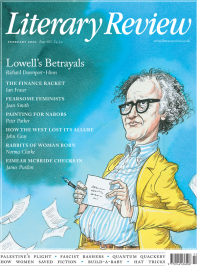Adrian Tinniswood
Doing the Lord’s Work
Providence Lost: The Rise & Fall of Cromwell’s Protectorate
By Paul Lay
Head of Zeus 326pp £30
‘I would fain know what the soldier hath fought for all this while?’ That question, posed by the Leveller Thomas Rainborowe during the Putney Debates of 1647, hangs over Paul Lay’s enjoyable and erudite new book, just as it hung over the several efforts to create a new society in England in the 1650s following the end of the Civil War. What had the years of conflict been for? Was there to be more of the same – government by an elite that answered only to itself? Or were the victors in the Civil War of the 1640s going to build a city on a hill, where the saints would reign in glory while they waited patiently for the last days?
Providence Lost explores the various attempts to answer those questions during the extraordinary eleven years when England was a republic – and, more specifically, during the period between 16 December 1653, when Oliver Cromwell was sworn in as Lord Protector, and 25 May 1659, when his hapless son and successor, Richard, submitted his resignation to the Rump Parliament and the Protectorate was formally dissolved. Lay rightly places religion at the heart of things, because, for the men who had fought, the peace was a religious peace, just as their war had been a war of religion. The soldiers who had marched into battle singing psalms still saw themselves as God’s instruments. So did their commanders. So did Cromwell himself. God moved in them, and they had won their wars because God had been on their side. When peace came, God would work through them to win that too.
That was fine as long as things were going their way. The problems began when, after a string of military victories that left them feeling invincible, the providentialists began to suffer setbacks. For example, there was the disastrous Western Design, the name given to an expedition launched in 1654 to

Sign Up to our newsletter
Receive free articles, highlights from the archive, news, details of prizes, and much more.@Lit_Review
Follow Literary Review on Twitter
Twitter Feed
Margaret Atwood has become a cultural weathervane, blamed for predicting dystopia and celebrated for resisting it. Yet her ‘memoir of sorts’ reveals a more complicated, playful figure.
@sophieolive introduces us to a young Peggy.
Sophie Oliver - Ms Fixit’s Characteristics
Sophie Oliver: Ms Fixit’s Characteristics - Book of Lives: A Memoir of Sorts by Margaret Atwood
literaryreview.co.uk
For a writer so ubiquitous, George Orwell remains curiously elusive. His voice is lost, his image scarce; all that survives is the prose, and the interpretations built upon it.
@Dorianlynskey wonders what is to be done.
Dorian Lynskey - Doublethink & Doubt
Dorian Lynskey: Doublethink & Doubt - Orwell: 2+2=5 by Raoul Peck (dir); George Orwell: Life and Legacy by Robert Colls
literaryreview.co.uk
The court of Henry VIII is easy to envision thanks to Hans Holbein the Younger’s portraits: the bearded king, Anne of Cleves in red and gold, Thomas Cromwell demure in black.
Peter Marshall paints a picture of the artist himself.
Peter Marshall - Varnish & Virtue
Peter Marshall: Varnish & Virtue - Holbein: Renaissance Master by Elizabeth Goldring
literaryreview.co.uk